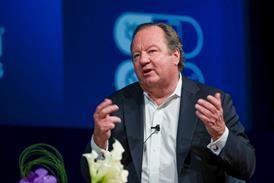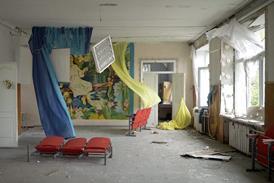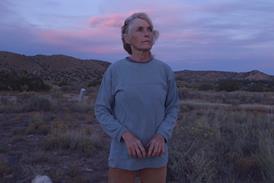
As the third edition Red Sea International Film Festival kicks off today, the fledgling Saudi event has fast become a magnet for an international industry looking to access funding, talent and stories from the Middle East.
A significant number of international sales agents, distributors, financiers, producers and festival chiefs are travelling to Jeddah for Red Sea for the first time this year, making the trip despite regional tensions caused by Israel-Hamas war and an anticipated post-strike scaling up of production in the US and Europe.
At a time when US streamers and studios and European commercial broadcasters have slashed spend and amid subdued dealmaking at AFM and European markets, entrepreneurial execs have come to Saudi to explore new opportunities.
Saudi Arabia is investing heavily in its film industry, both to attract international features with generous tax incentives and new infrastructure and to support up and coming local talent. From a standing start, Saudi has also quickly emerged as the biggest MENA theatrical territory, with its 69 cinemas taking $87m in the third quarter of 2023, according to Saudi Film Commission figures.
Festival execs, sales agents and distributors have also come to learn more about a new generation of Arabic and African writers, directors and producers that is making a mark on the international stage. For example, three Saudi films – Mandoob, Hajjan and Naga – world premiered at Toronto this year. Elsewhere, Amjad Al Rasheed’s Inshallah A Boy, Kaouther Ben Hania’s Four Daughters and Baloji’s Omen bowed at Cannes.
Many execs will head to the Red Sea Souk, which comprises an exhibition space, talks programme and talent focus as well as the Project Market and Work-In-Progress Showcase, a presentation of 26 projects and six rough cuts from African and Arab directors.
Source of world cinema
Wendy Lidell, SVP of theatrical and non-theatrical distribution and acquisitions at US distributor Kino Lorber is attending Red Sea for the first time. “Every year for the last decade, we have seen the MENA region become a more and more important source for world class cinema.” She told Screen that she will be in Jeddah to look for “another great film” to add to its MENA roster, which includes Four Daughters, made with the support of the Red Sea Film Festival Foundation and Tunisia’s submission to the Academy Awards, and Casablanca Beats by Nabil Ayouch. “Who knows, we may also pick up another Red Sea Competition winner like 2021’s Brighton 4th,” said Liddell.
Alexis Hoffman, head of acquisitions at French distributor and sales agent Bac Films, will be at the Red Sea Souk to look for prospective Arabic and African projects. He wants to learn how the MENA market is growing, economically and artistically, and is aiming expand his Arabic and African network by meeting producers, sales agents and talents from the region. “The creative potential of the region is really big,” said Hoffman.
Gaetano Maiorino, managing director and head of acquisitions at Rome-based True Colours, is mainly attending the Red Sea Souk. True Colours’ sales slate includes MENA titles such as 200 Meters by Ameen Nayfeh and Ahmed Yassin al Daradji’s Venice Horizons title Hanging Gardens. “We believe in new voices coming from the region and we want to discover more engaging stories. The Red Sea is a very interesting place for doing so,” said Maiorino.
Other execs travelling to Red Sea include Phil Hunt, co-founder and managing director of UK financier Head Gear Films and the co-managing director of international sales outfit Bankside Films. He said there is both an export and investment focus to his trip: to discuss with Saudi execs how to create local language films for the international marketplace and to spread the word about his indie film lending and investment company.
Talent search
For his part, Giona A. Nazzaro, the artistic director of Locarno Film Festival is travelling to Red Sea to “discover some unique talent to invite to Locarno to world premiere and to establish friendships and partnerships that will hopefully create bonds and collaborations.”
Nazzaro said that films from MENA may be the most interesting aspect of world cinema right now. The reason, he says, is that its filmmakers are challenged constantly by history and its complexities. “They must produce stories that face those elements instead of just rummaging in their individual concerns,” says Nazzaro.
Red Sea, Nazzaro noted, has quickly become one of the main events in the MENA region. “All the key talents are there and in terms of projects supported the quality is quite strong.”
Dennis Ruh, director of the European Film Market at the Berlinale, said Red Sea is a great opportunity to meet all the industry players from Saudi Arabia and the MENA region and to engage with emerging filmmakers. He is attending to “foster our good relationship with exhibitors from the region, but also to establish new liaisons with local distributors.” Ruh also noted that Red Sea has just started presenting series content and he will take a closer look ahead of the EFM’s Berlinale Series market.
Meanwhile, Karim Safieddine, founder of Beirut-based VOD platform Cinemoz, which has recently pushed into original production, is heading to Red Sea to announce a new slate of film and TV productions from the Middle East. He is looking for co-production partners for projects that either are aimed at Arabic speaking audiences or that take Middle Eastern stories and talent to the world. They include Arab zombie wedding satire Zhabibi, and the first “Saudi led sci-fi space thriller Lemnos.
“We’ve seen more appetite for MENA original and culturally representative stories from a new generation of writers, directors and producers who are slowly but surely proving that the market is poised for a significant growth on the demand side,” said Safieddine.
He points to films such as Saudi box office hit Sattar, Red Sea opener HWJN and Netflix title Al Khallat+ as examples of how regional commissioners and global studios “seem to have narrowed down the stories, budgets and strategy to build a more dynamic pipeline of productions over the upcoming years.”
Key to cracking the MENA market, Safieddine added, is taking creative risks in unique, culturally representative Middle Eastern storytelling “for an audience still awaiting its tidal wave.”
-
Screen’s 2023 Arab Stars of Tomorrow to be revealed at Red Sea festival

























No comments yet